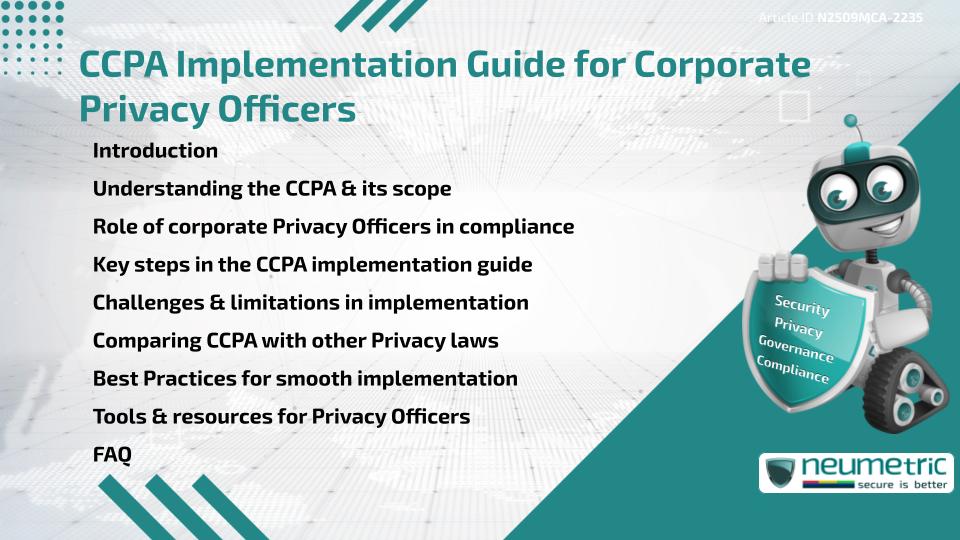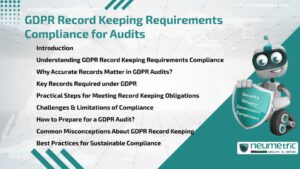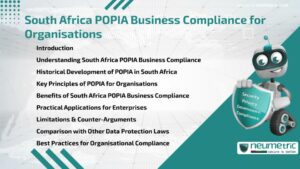Table of Contents
ToggleIntroduction
The California Consumer Privacy Act [CCPA] is one of the most significant Privacy Laws in the United States. It provides that California residents have acquired new rights concerning their personal information and have imposed obligations on businesses that manage such data. For corporate Privacy Officers, ensuring compliance can be complex, requiring both legal awareness & operational execution. This CCPA implementation guide explains the law’s scope, the role of corporate Privacy Officers, step-by-step compliance measures, potential challenges, comparisons with similar laws & practical Best Practices. It provides a structured approach for professionals tasked with safeguarding Consumer Data while maintaining Corporate Trust & Transparency.
Understanding the CCPA & its scope
The CCPA, effective from January 2020, gives Consumers Rights such as knowing what data is collected, requesting data deletion & opting out of data sales. It applies to businesses that meet thresholds such as annual revenues over twenty-five (25) million dollars, handle data of more than fifty thousand (50,000) Consumers or derive more than half of their income from selling Personal Data. Unlike Federal Privacy Frameworks, the CCPA is state-driven yet has national implications for companies engaging with California Residents.
Role of corporate Privacy Officers in compliance
Corporate Privacy Officers serve as the main drivers of compliance. Their responsibilities include evaluating data flows, implementing internal Privacy Policies, training staff, monitoring regulatory updates & responding to consumer requests. They must also collaborate with legal, IT & business teams to establish accountability. In practice, the role goes beyond policy drafting-it involves bridging regulatory language with technical & operational processes.
Key steps in the CCPA implementation guide
A structured compliance process often includes:
- Data mapping: Identifying what Consumer Data is collected, where it resides & how it is shared.
- Policy updates: Revising Privacy notices to ensure transparency in data usage.
- Consumer Rights Management: Creating processes to handle access, deletion & opt-out requests.
- Vendor Management: Reviewing Third Party agreements for data handling obligations.
- Training & Awareness: Ensuring Employees understand responsibilities under the CCPA.
The California Attorney General’s site provides official guidelines for these compliance steps.
Challenges & limitations in implementation
Businesses may struggle with accurately mapping data due to legacy systems or multiple vendors. Balancing operational efficiency with compliance can also be difficult when consumer requests escalate. Furthermore, ambiguity in certain provisions creates uncertainty in how companies interpret their obligations. These limitations highlight the need for Continuous Monitoring & flexibility in Privacy programs.
Comparing CCPA with other Privacy laws
The CCPA is usually compared with the European Union’s General Data Protection Regulation [GDPR]. While both laws focus on Consumer Data rights, the CCPA is narrower in scope & less prescriptive in certain areas. For example, GDPR applies globally to entities handling EU data, whereas the CCPA is limited to California Residents. On the other hand, CCPA’s opt-out requirement for data sales is more specific than GDPR’s consent model.
Best Practices for smooth implementation
To achieve compliance efficiently, Privacy Officers can adopt several Best Practices:
- Automate request handling: Using digital platforms to process consumer requests reduces manual errors.
- Conduct regular Audits: Periodic reviews identify gaps & ensure Policies remain current.
- Engage cross-functional teams: Compliance is more effective when IT, HR & marketing collaborate.
- Stay updated: Enrolling in regulatory notifications guarantees prompt updates.
Tools & resources for Privacy Officers
Corporate Privacy Officers have access to several resources for guidance & support:
- Regulatory portals: Such as the California Privacy Protection Agency
- Professional Associations: International Association of Privacy Professionals [IAPP] provides Training & Certification.
- Compliance tools: Software for Consent Management & Data Inventory.
- Educational materials: Webinars & Whitepapers offering implementation strategies.
These resources ensure Officers are well-prepared to adapt their programs as requirements evolve.
Takeaways
The CCPA implementation guide is not just a compliance checklist but a roadmap for building consumer trust. Corporate Privacy Officers must balance regulatory demands with practical Business Operations, while proactively addressing challenges. By following structured steps, leveraging Best Practices & using available resources, they can strengthen both compliance & corporate reputation.
FAQ
What is the purpose of the CCPA implementation guide?
It provides a structured Framework for businesses & Privacy Officers to comply with the California Consumer Privacy Act.
Who must comply with the CCPA?
Businesses that meet revenue thresholds, handle data of more than fifty thousand (50,000) consumers or derive significant income from data sales must comply.
How does CCPA differ from GDPR?
CCPA is state-specific & focuses on opt-out rights for data sales, whereas GDPR applies globally & emphasizes consent-based data processing.
What are consumer rights under CCPA?
Consumers can request disclosure of collected data, demand deletion, opt out of data sales & receive equal service without discrimination.
What role do corporate Privacy Officers play in CCPA compliance?
They coordinate compliance efforts, implement data Policies, train Employees & ensure consumer requests are managed properly.
What challenges arise in CCPA implementation?
Data mapping difficulties, handling large volumes of consumer requests & interpreting ambiguous provisions are common challenges.
Where can businesses find reliable resources on CCPA?
Trusted sources include the California Attorney General’s office, California Privacy Protection Agency & professional associations like IAPP.
References
Need help for Security, Privacy, Governance & VAPT?
Neumetric provides organisations the necessary help to achieve their Cybersecurity, Compliance, Governance, Privacy, Certifications & Pentesting needs.
Organisations & Businesses, specifically those which provide SaaS & AI Solutions in the Fintech, BFSI & other regulated sectors, usually need a Cybersecurity Partner for meeting & maintaining the ongoing Security & Privacy needs & requirements of their Enterprise Clients & Privacy conscious Customers.
SOC 2, ISO 27001, ISO 42001, NIST, HIPAA, HECVAT, EU GDPR are some of the Frameworks that are served by Fusion – a SaaS, multimodular, multitenant, centralised, automated, Cybersecurity & Compliance Management system.
Neumetric also provides Expert Services for technical security which covers VAPT for Web Applications, APIs, iOS & Android Mobile Apps, Security Testing for AWS & other Cloud Environments & Cloud Infrastructure & other similar scopes.
Reach out to us by Email or filling out the Contact Form…





